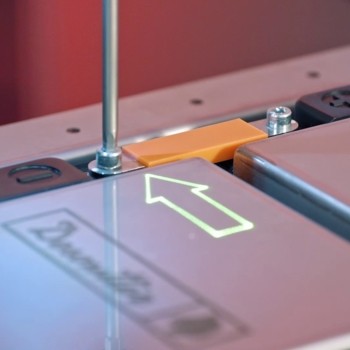Real-Time Location Systems (RTLS) have transformed manufacturing line operations by providing accurate, real-time tracking and monitoring capabilities for assets, tools, and movement.
As individuals responsible for manufacturing line management and quality assurance, selecting the right RTLS solution is crucial for optimising efficiency, streamlining processes, and ensuring product quality. In this comprehensive guide, we will explore the key factors that should be considered when choosing an RTLS system align with the unique requirements of manufacturing line environments.
Define Your Objectives
Before delving into the selection process, it's crucial to define your objectives clearly. Determine the specific goals you want to achieve with an RTLS system in your manufacturing line operations. Whether it's improving production efficiency, enhancing asset tracking accuracy, optimising tool management, or ensuring quality control, having a clear understanding of your objectives will guide you in evaluating the suitability of different RTLS solutions.
Assess Tracking Capabilities
When selecting an RTLS system, assess its tracking capabilities, as they are fundamental to manufacturing line operations. Look for a system that offers accurate and real-time tracking of assets, tools, and movement within your manufacturing facility. Evaluate if the system utilises technologies such as Infrared, RFID, GPS, or Bluetooth beacons to ensure reliable and precise tracking throughout the production process.
Consider Customisation and Scalability
Manufacturing line environments often have unique requirements. Therefore, it's crucial to choose an RTLS system that offers customisation options to tailor the solution to your specific manufacturing processes. Evaluate if the system can be easily scaled to accommodate changes in your production lines or expansions in your facility, ensuring that the RTLS system can grow alongside your operations.
Evaluate Tracking Software
The tracking software associated with an RTLS system plays a vital role in data management, analysis, and quality control. Look for tracking software that offers intuitive interfaces, real-time monitoring, and comprehensive reporting capabilities. The software should provide insights into assembly progress, asset location, tool utilization, and quality checkpoints, enabling you to make data-driven decisions and ensure high product quality.
Integration and Interoperability
An effective RTLS system should seamlessly integrate with your existing software and quality management systems. Consider whether the solution offers integration options with your manufacturing line management software, quality control databases, or production planning systems. Compatibility and interoperability between the RTLS system and your current infrastructure are crucial for smooth implementation and streamlined operations.
Enhance Efficiency through Visual Operator Guidance
Consider integrating visual operator guidance into your RTLS system. This feature offers real-time visual instructions, reducing errors and boosting efficiency. Displayed on screens, applications, AR devices, or wearables, step-by-step guidance enhances tasks like assembly and quality checks, keeping your workforce well-informed and connected. This addition ensures improved productivity and product excellence.
Consider Total Cost of Ownership (TCO)
When selecting an RTLS system, it's important to evaluate the total cost of ownership (TCO) beyond the initial investment. Assess not only the upfront costs but also the ongoing maintenance, support, and potential future upgrades. Consider the costs associated with hardware, software licenses, training, and any additional infrastructure requirements. Additionally, evaluate the training and support provided by the RTLS vendor to ensure a successful implementation and long-term cost-effectiveness.
Conclusion: Choosing the right Real-Time Location System (RTLS) is vital for optimising manufacturing line operations, quality control, and product traceability within your organisation. By defining your objectives, assessing tracking capabilities, considering customisation and scalability, evaluating tracking software, prioritising integration, and considering the total cost of ownership, you can make an informed decision. Select an RTLS system that aligns with your manufacturing line requirements, streamlines operations, ensures product quality, and provides real-time visibility into your processes. With the right RTLS solution, manufacturing line managers and quality managers can enhance efficiency, drive continuous improvement, and meet the highest standards of product quality.
Visit our INNOVATION CENTRE to see nexonar for yourself - contact us to book:

